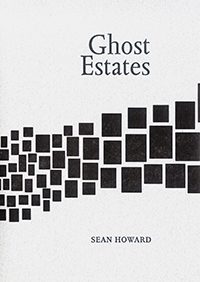Reviews
Poetry Review by Trevor Cook
Sean Howard, Ghost Estates (Kentville: Gaspereau, 2018). Paperbound, 80 pp., $19.95.
 Plato knew you had to be mad to write poetry. Anyone in his right mind can write verse, but a poet has to be possessed, imperfect, and unfulfilled. Poets are not just skilled; they are seized by a mania that demands passionate expression.
Plato knew you had to be mad to write poetry. Anyone in his right mind can write verse, but a poet has to be possessed, imperfect, and unfulfilled. Poets are not just skilled; they are seized by a mania that demands passionate expression.
Plato was not talking about mental illness, as we might understand it. He was talking about “that fine madnes,” as the Elizabethan poet Michael Drayton defined it, “Which rightly should possesse a Poets braine.” He was talking about what drives Sean Howard’s Ghost Estates, a rhapsody in forty-three movements inspired by a lunchtime lecture on Seamus Heaney, Orpheus, and Ireland in 2010.
Ghost Estates, though eight years in production, is too impassioned for perfection. It recreates the enthusiasm a stimulating lecture can generate, a kind of frenetic free association barely contained by the speaker’s scope, the concert in your head you’re certain you’ll never forget, but that usually ends up as a few unintelligible notes. For most people, it would be mad to fixate on a single lecture for so long. But the ability to sustain for some sixty pages the free-form frenzy it releases is a unique ability of what Howard calls the poet’s “Dionysian psyche.”
The problem with such gifts, as Plato knew, is that they don’t have much purpose—one reason poets were banned from his ideal state. Plato has provoked more defenses of poetry than anyone, and Ghost Estates can be read as part of that tradition. Like Heaney, Howard is preoccupied with poetry’s potential futility: “do I really dare believe / in poetry?” For Heaney, poetry’s efficacy was in a sense negligible—“no lyric ever stopped a tank”—and in a sense unlimited. At the startof Ghost Estates, which echoes this assessment, Heaney, asked for his “papers” at a military checkpoint in Northern Ireland, is tempted to ask the soldier for his “poems” in return, raising the question of the relationship between politics and poetics.
Unlike Heaney, however, Howard is less interested in answers than in how such questions inevitably put poets on the defensive, when they should have the right to ask questions in return. In response to Theodor Adorno, for example, who famously questioned poetry’s value after the Holocaust, the speaker asks, somewhat impudently, “what if prose made Auschwitz / possible?” Likewise, to those who question the poet’s task: “Poetry, of / course: do we ask what the shoemaker’s / task is?” For Howard, the poet is not necessarily to blame if others cannot appreciate his craft. When asked by a journalist what are the blues, we are told, Van Morrison responded as though “Embarrassed by the question, or feeling / sorry at least for the questioner.”
Howard is not without answers. Poetry has purpose: “To make something fit, something / usefully beautiful—something, / even, as useful as / beauty!” But he maintains that it should not always be poetry’s task to justify its own existence. Those who manage without it should have to justify themselves instead. Ghost Estates celebrates earlier civilizations when “words, in the right / hands, used to change things,” as with the Iroquois, who thanked the trees for providing “beauty, among other useful / things,” as well as the ancients, who were not all in agreement with Plato. “This is how myths behave / when they work….” By contrast, the “modern myth of the postmyth- / ic” has bankrupted society, as seen in the abandoned housing developments in Ireland known as “ghost estates.” The academy too has yet to offer a superior polity to poetry. As a Mi’kmaw woman observes in the closing lines of the poem, she used to believe “the Great Spirit / was everywhere” until she walked into a modern university building.
Howard is himself a professor of political science, so cannot resist including six pages of endnotes, but thankfully Ghost Estates is not an academic work. It is a poem that playfully puns on the “Quest” in question, obsessing over the meaning of poetry as much for the poet as for his audience, and resisting the allure of cunning answers. At one point, Howard references a seminar he gave at Cape Breton University on the clash between scientific and spiritual world views, which is an apt way to think of this book, with its eclectic and rarefied syllabus: Jung, Eliade, Seán O’Casey, Shostakovich, Don McKay, David Jones, Rumi, Van Morrison, Whitman, Tom Waits, Joseph Campbell, Nietzsche, Rilke, Coltrane, Dante, Peter Sanger, William Brandon, David Sylvian, Plato, T. S. Eliot, Yukio Mishima, Frye, Robert Graves, Dickinson, Beckett, Evan Parker, and Webern.
It’s precisely because courses like this don’t exist that Ghost Estates is required reading for anyone who wishes to experience what poetry has to offer. Howard claims to have learnt about Orpheus and the Grail as a young man, “hastily arming” himself with the myths “to fend off a / dragon psychosis.” Perhaps, reading poetry helps to make sense of the madness around us. Perhaps, writing it even helps make sense of the madness within us. Howard doesn’t pretend to have the answer; he simply models what the quest might look like: “Did I slay the dragon? Well, / fortunately, yes and no—which / meant I could start to set out / as a poet!”
—Trevor Cook









